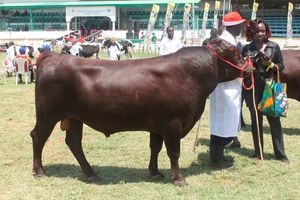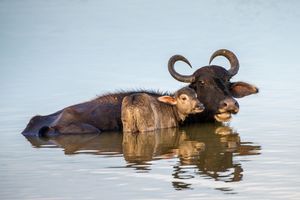Breaking News: Former Lugari MP Cyrus Jirongo dies in a road crash

Brazil Ambassador to Kenya Silvio Albuquerque, Makongi Agri Ltd Managing Director Tim Chesire and Animal Breeding and Reproductive Services Deputy Director David Ojigo receive the first Girolando embryo consignment at the Embassy of Brazil in Nairobi on March 20, 2025.
The dairy industry in Kenya has been boosted with the official introduction of Girolando cow embryos, a top milk-producing breed from Brazil.
However, the breed’s semen has been in the country for a few years.
Some 350 embryos have been introduced in Kenya through Makongi Agri Ltd and its sister company, Indicus Genetics – in Eldoret – in partnership with the Embassy of Brazil.
Makongi Farm has been working with Samvet Embriões, a Brazilian firm specialising in bovine embryo transfer (ET) and in vitro fertilisation (IVF).
The company focuses on improving the reproductive performance of dairy and beef cattle.
“We have been conducting research on embryo technology since 2015. Our first visit to Brazil was in 2010. We appreciate the partnership with Brazil alongside the International Livestock Research Institute (ILRI), the Directorate of Veterinary Services (DVS) and the Kenya Genetic Resource Centre. It is a breakthrough,” Tim Chesire, the director of Makongi Farm Director, said during the launch of the embryo in Nairobi.
Girolando breed is known for its resilience to climate change shocks and extreme weather.

A semen storage tank during the flagging off of the Girolando embryo consignment from Brazil.
It has a high feed conversion rate, with an average daily milk production of 17 litres. The cows eat ordinary normal grass and pasture.
“It does not necessarily need silage or dairy meal to produce that amount of milk. Girolando is a moderate producer,” Chesire said.
An embryo is an early-stage developmental form of a calf, created when a sperm fertilises an egg in a cow. It undergoes cell divisions and development before implanting in the uterus and growing into a foetus.
Embryos are used in reproduction and breeding, allowing farmers to breed cattle with superior genetics.
Apart from the 350 embryos, the centre – in collaboration with the Kenya Genetic Resource Centre and the government – is running a project aimed at bringing in 1,500 additional embryos, Chesire said.
They will be supplied to counties and distributed across Africa.
Brazilian Ambassador to Kenya, Silvio Albuquerque, said introducing Girolando embryos to the country would boost the dairy sector
“It is a revolution as it will enhance productivity, resilience, and adaptability to tropical climates. This breed is known for high milk yields and ability to thrive in conditions similar to those in Kenya,” he said.
The diplomat added that Kenyan farmers would be given tools needed to enhance food security, reduce dependence on imports and improve nutrition.
Introducing new animal breeds in the country must be approved by the DVS and the Kenya Animal Genetic Resources Centre.
These two state-owned agencies facilitated the process of introducing the Girolando embryos.
DVS Deputy Director, David Ojigo, said animal genetics or breeds introduced must comply with the World Health Organization and International Embryo Transfer Society guidelines.
Social activity
The average cost of a Girolando cow in Kenya is $3,000 (Sh390,000), while it goes for $1,200 in Brazil.
To improve the livestock sub-sector, Kenyan farmers largely rely on artificial insemination – technology whose uptake has been slow.
Livestock contributes about 12 percent to Kenya’s GDP directly and indirectly.
It also accounts for more than 30 percent of the farm gate value of agricultural commodities.
Livestock production is a major economic and social activity for communities in high rainfall areas, where dairy farming thrives, and in arid and semi-arid lands, where meat production dominates.
According to the Ministry of Agriculture and Livestock Development, Kenya has around 5.1 million dairy cows.
Milk production in 2023 was around 5.2 billion litres with a value of Sh312.7 billion.











